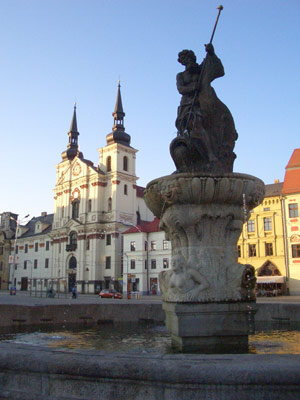 Whistle from Jihlava
Whistle from Jihlava
| Trackable Options |
 Found this item? Log in.
Found this item? Log in. |
 Printable information sheet to attach to Whistle from Jihlava
Print Info Sheet
Printable information sheet to attach to Whistle from Jihlava
Print Info Sheet |
| There is 1 user watching this listing. |
-
Owner:
-
Alcroon
Message this owner
-
Released:
-
Thursday, December 31, 2009
-
Origin:
-
Kraj Vysočina, Czechia
-
Recently Spotted:
-
Unknown Location
The owner hasn't set their collectible preference.
Use TB33WCF to reference this item.
First time logging a Trackable? Click here.
I want to visit hills, mountains and views. On these places I want to whistle. Chtel bych putovat po kopcich, horach a vyhledech. Na techto mistech bych si chtel zapiskat.
Travel Bug was established on Silvestr 31.12.2009. Travel Bug zalozen na Silvestra 31.12.2009.

The city's German name, Iglau, is derived from the German word for hedgehog, Igel, hence the hedgehog on the coat of arms. An old Slavic settlement upon a ford was moved on a nearby hill where the mining town was founded (ca. 1240) by king Václav I, in the Middle Ages inhabited mostly by Germans (coming mostly from Northern Bavaria and Upper Saxony). Medieval mines surrounded by mining settlement were localized outside the walls of medieval town (local name Stare Hory). According to legend, the silver mines were worked as early as 799. There is, however, no historical evidence for such statements.
In the era of the Hussite Wars, Jihlava remained a Catholic stronghold and managed to resist a number of sieges. Later at Jihlava, on July 5, 1436, the treaty was made with the Hussites, by which the emperor Sigismund was acknowledged king of Bohemia. A marble relief near the town marks the spot where Ferdinand I, in 1527, swore fidelity to the Bohemian estates.
During the Thirty Years' War Jihlava was twice captured by the Swedes. In 1742 it fell into the hands of the Prussians, and in December 1805 the Bavarians under Wrede were defeated near the town. In 1860 it became the childhood home of Bohemian-Austrian composer Gustav Mahler, who retained his ties to the town until the death of both of his parents in 1889.
Until World War I the town was an important Austro-Hungarian Army military centre. In 1914 the I, II and III. Battalion of the Moravian Infantry Regiment No. 81 (Bataillon des Mährischen Infanterie-Regiments Nummer. 81) and the Second Battalion of the Landwehr infantry regiment number 14 (II. Bataillon des Landwehr-Infanterie-Regiments Nr. 14) were the garrison troops.
After World War I the town constituted a German language island (Sprachinsel) within Slavic speaking Moravia. This affected local politics as it remained the centre of the second largest German-speaking enclave in the republic of Czechoslovakia (after Schönhengst/Hřebečsko). After the Czechoslovak Republic was proclaimed on 28 October 1918, the indigenous Germans of Bohemia and Moravia, claiming the right to self-determination according to the 10th of President Woodrow Wilson's Fourteen Points, demanded that their homeland areas remain with the new Austrian State. The Volksdeutsche of Iglau / Jihlava relied on peaceful opposition to the Czech military occupation of their region, a process that started on 31 October 1918 and was completed on 28 January 1919. Thereafter extremist political figures like Hans Krebs, editor of the Iglauer Volkswehr newspaper, became prominent with the rise of Nazism and the Nazi occupation (1939–1945).
The area remained, until the end of World War II, a distinctive regional folk culture reflecting hundreds of years of local customs. The town dialect of German was a unique branch of Mitteldeutsch. Musicians often used homemade instruments and original groups of four fiddles (Vierergruppen Fiedeln) and Ploschperment. Typical folk dances were the Hatschou, Tuschen and Radln. Peasant women like wearing old "pairische" Scharkaröckchen costumes with shiny dark skirts and big red cloths.
In protest against the Soviet occupation of Czechoslovakia in 1969 Evzen Plocek set himself on fire in the town marketplace in emulation of others in Prague. Today there is a memorial plaque to him.
Gallery Images related to Whistle from Jihlava
View 1 Gallery Image
Tracking History (5887.1mi) View Map